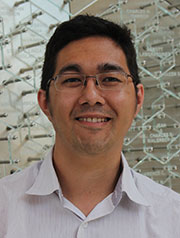- Mailing Address:
- School of Pharmacy
- University of Wisconsin
- 777 Highland Ave.
- Madison, WI 53705-2222
- Office:
- 6109 Rennebohm Hall
- Phone: 608-262-3829 Email: jason.kwan@wisc.edu
- Pharmaceutical Sciences Division
- Lab Website

Jason Kwan, PhD
Associate Professor
Historically, natural products (small molecules produced by living organisms) have been an important source of drug leads and chemical tools in biology. The marine environment, in particular, is currently being vigorously explored for natural product discovery because of its unrivalled biodiversity. Intense competition for space and resources likely contributes to the expression of natural products to gain a competitive advantage. Microorganisms are especially adept at making natural products, and many form stable associations with higher organisms, which use bacterial products as chemical defenses. Such symbiotic bacteria are implicated in the production of many natural products that have been isolated from marine invertebrates. However, it is often the case that little is known about the bacterium that makes a particular natural product in an animal, because of difficulty in culturing such symbionts, and because the animal may harbor a very complex microbiome.
We aim to discover new natural products and their biosynthetic pathways, and to understand the role of natural products in symbiotic relationships. We tackle these problems using traditional culture-isolation techniques and in a culture-independent way using shotgun metagenomics. In this way, we can investigate symbiotic relationships through direct sequencing of DNA from the host. Natural products that are produced in symbiotic relationships that have stood the test of vast evolutionary time are likely to be the most important, both ecologically and as drug candidates. However, symbionts from such systems are likely to be extremely recalcitrant to culturing efforts, and may be minor components of a complex microbiome. Metagenomic sequence data allows us to elucidate the biosynthetic pathways of natural products, and it often tells us much about the producing organism. Understanding how natural products are made allows us to work towards expression of these products in heterologous hosts, potentially allowing us access to these compounds for further study and development.
Jason received his Master of Pharmacy (MPharm) degree from the University of Bath, United Kingdom in 2004, and a PhD degree from the University of Florida with Hendrik Luesch in 2010. He held a postdoctoral research position at the University of Utah under Eric W. Schmidt (2010-2013). He joined the faculty at the School of Pharmacy in 2013.
Education:
- MPharm 2004 Master of Pharmacy - University of Bath, United Kingdom
- PhD 2010 Pharm Sci - University of Florida
- Pharmaceutical Biochemistry 718-432 (Course coordinator)
- Waterworth, S. C.; Isemonger, E. W.; Rees, E. R.; Dorrington, R. A.; Kwan, J. C. Conserved bacterial genomes from two geographically isolated peritidal stromatolite formations shed light on potential functional guilds. Environmental Microbiology Reports 2021, 13, 126–137.
- Waterworth, S. C.; Flórez, L. V.; Rees, E. R.; Hertweck, C.; Kaltenpoth, M.; Kwan, J. C. Horizontal gene transfer to a defensive symbiont with a reduced genome amongst a multipartite beetle microbiome. mBio 2020, 11, e02430-19.
- Acharya, D. D.; Miller, I. J.; Cui, Y.; Braun, D.; Berres, M.; Styles, M.; Li, L.; Kwan, J.; Rajski, S.; Blackwell, H. E.; Bugni, T. S. Omics technologies to understand silent biosynthetic gene cluster activation in Micromonospora sp. ACS Chemical Biology 2019, 14, 1260–1270.
- Miller, I. J.; Rees, E. R.; Ross, J.; Miller, I.; Baxa, J.; Lopera, J.; Kerby, R.; Rey, F.; Kwan, J. C. Autometa: Automated deconvolution of genomes from host-associated metagenomes. Nucleic Acids Research 2019, 47, e57
- Flórez, L. V.; Scherlach, K.; Miller, I. J.; Rodrigues, A.; Kwan, J. C.; Hertweck, C.; Kaltenpoth, M. An antifungal polyketide associated with horizontally acquired genes supports symbiont-mediated defense in Lagria villosa beetles. Nature Communications 2018, 9, 2478.
- Kwan, J. C. The who, why and how of small molecule production in invertebrate microbiomes - basic insights fueling drug discovery. mSystems 2018, 3, e00186-17.
- Lopera, J.; Miller, I. J.; McPhail, K.; Kwan, J. C. Increased biosynthetic gene dosage in a genome-reduced defensive bacterial symbiont. mSystems 2017, 2, e00096-17.
- Miller, I. J.; Chevrette, M. G.; Kwan, J. C. Interpreting microbial biosynthesis in the genomic age: Biological and practical considerations. Marine Drugs 2017, 15, 165.
- Miller, I. J.; Weyna, T.R., Fong, S.S., Lim-Fong, G.E., Kwan, J.C. Single sample resolution of rare microbial dark matter in a marine invertebrate metagenome. Scientific Reports 2016, 6, 34362.
- Miller, I. J.; Vanee, N., Fong, S.S., Lim-Fong, G.E., Kwan, J.C. Lack of overt genome reduction in the bryostatin-producing bryozoan symbiont, “Candidatus Endobugula sertula”. Applied and Environmental Microbiology 2016, 67, 623–631.